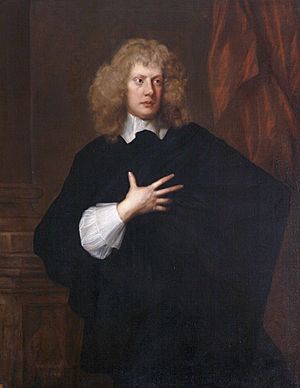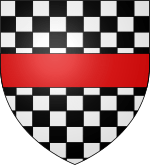Sir John Acland, 1st Baronet facts for kids
Sir John Acland, 1st Baronet (born around 1591 – died August 24, 1647) was an important figure from Devon, England. He lived at Acland and Columb John. During the English Civil War, he was a leader for King Charles I, known as a Royalist. He even kept a small army base at his home, Columb John, to support the King.
In 1644, the King gave him the special title of Baronet because of his loyalty. However, the official papers for this title were lost during the war. So, his title wasn't officially confirmed until 1677/8, many years after he had passed away. After the war, in 1646, he made an agreement with Parliament to keep his family's land. He died the next year.
Contents
Who Was Sir John Acland?
Sir John Acland was the son of Sir Arthur Acland, who died in 1610. His mother was Eleanor Mallet. Sir John took over the family's estates after his grandfather, Hugh Acland, passed away in 1622.
Sir John's Life and Role in the Civil War
Sir John moved his main home from Acland to Columb John. This had been the home of his great-uncle, another Sir John Acland.
In 1641, he became the Sheriff of Devon. This was an important job, like being the chief law enforcement officer for the county.
As the English Civil War was about to begin, King Charles I chose Sir John as one of 28 special "Commissioners of Array" for Devon on July 19, 1642. Their job was to gather soldiers and supplies for the King's army.
Sir John raised two groups of soldiers for the King. By the summer of 1643, his home at Columb John was the only place in Devon still holding out for the King, until the city of Exeter was captured.
Because of his strong support, King Charles I decided to make him a Baronet on June 24, 1644. This was a special honor, making him "Sir John Acland, Baronet of Columb John." But, as mentioned, the official documents were either lost or never fully completed during the war. This meant the title wasn't officially recognized until much later. His family didn't use the title for a while, until his fourth son, Sir Hugh Acland, became the 5th Baronet.
As the war turned against the King's side in the west of England, Sir John had to stop fighting. General Fairfax, a leader for Parliament, used Columb John as his base while his army surrounded Exeter in 1645-1646. Exeter finally gave up on April 9, 1646.
Sir John was part of the surrender agreement. General Fairfax even suggested to Parliament that Sir John should be allowed to keep his land by paying a reasonable fine. In July 1646, his fine was set at £1,727. He paid half of it in August, which temporarily stopped Parliament from taking his land.
However, a local brewer named Richard Evans caused more trouble, and Sir John's estate was temporarily taken again. Sir John became ill and passed away on August 24, 1647. After his death, his original fine was accepted in June 1648, and his family was allowed to keep their land.
Family Life
Around 1625, Sir John Acland married Elizabeth Vincent. She was his step-sister, as her father, Sir Francis Vincent, had married Sir John's mother, Eleanor Mallet, after Sir John's father died.
Sir John and Elizabeth had several children, including:
- Arthur Acland (born 1625), who died young.
- Francis Acland (born 1626/7), who also died as a baby.
- Sir Francis Acland, 2nd Baronet (died 1649), who was his oldest son to survive childhood. He became the 2nd Baronet but died soon after his father.
- Sir John Acland, 3rd Baronet (born around 1634 – died 1655), who took over the title after his older brother.
- Robert Acland (died 1655/6).
- Sir Hugh Acland, 5th Baronet (born around 1639 – died 1714), who later became the 5th Baronet.
- Charles Acland (died before 1651), who passed away without children.
- Susan or Susanna Acland (born around 1634 – died February 5, 1696/7).
- Eleanor Acland (born 1622 – died before 1647), who married Sir John Davie, 2nd Baronet.
- Elizabeth Acland (born 1624 – died before 1647).
Death and Burial
Sir John Acland died on August 24, 1647. He was buried in Stoke D'Abernon Church in Surrey. A special stone on the floor of the church marks his burial place, saying: "Sir John Ackland, of Ackland, in the county of Devon, Barronett."
 | Delilah Pierce |
 | Gordon Parks |
 | Augusta Savage |
 | Charles Ethan Porter |



